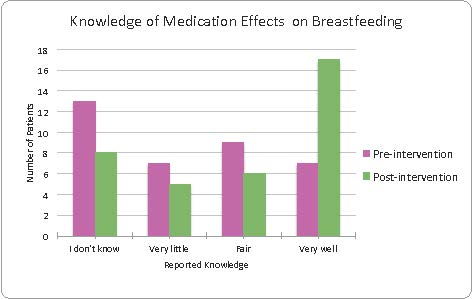Session Information
Session Type: Poster Session (Tuesday)
Session Time: 9:00AM-11:00AM
Background/Purpose: Managing rheumatologic conditions in women of childbearing age necessitates consideration of reproductive health issues. We studied reproductive health awareness in women with rheumatic disease by surveying them on the effectiveness of audiovisual (AV) and written educational interventions in improving their knowledge regarding pregnancy, fertility, lactation, and contraception.
Methods: We enrolled 101 women (ages 18-45) with rheumatic disease at our clinic and surveyed them on awareness of reproductive health issues as well as contraceptive practices. Respondents were randomized to view a video or receive a pamphlet with information on reproductive health issues and were surveyed again at a subsequent office visit.
Results: Pre-intervention surveys showed that of the 26 women who reported being sexually active with men and not using contraception (at risk of becoming pregnant), 19 (73%) were using teratogenic medications and thus at risk of adverse pregnancy outcomes. Furthermore, 32% of all participants reported not receiving any counseling previously regarding reproductive health.
74 (72%) received the intervention after an average of 6 months: 35 women (47%) watched the video and 39 (52%) received a pamphlet. 53 women (72%) returned a post-survey after an average of 9 months from time of intervention. 5 surveys were excluded from the final analysis due to not answering any post-survey questions.
Of the women who completed the post-intervention survey, 67% felt more knowledgeable about medication effects on fertility, 50% on pregnancy, and 47% on breastfeeding. 36%, 30%, and 36% reported improved awareness about fertility, pregnancy, and breastfeeding issues after the AV intervention compared to 30%, 19%, and 11% who received the pamphlet, although the difference did not reach statistical significance (see figure 1). After intervention, more women reported understanding these issues “very well” (see figures 2 and 3). In addition, fewer women (14/53; 26%) reported unprotected sex with men though many (11/14; 79%) were using teratogenic medications.
Conclusion: We previously reported that women with autoimmune diseases are not adequately counseled regarding reproductive health. Here, we show that women who received targeted education reported an increase in birth control use and knowledge about reproductive health, with a trend to better results in the AV arm. Women with rheumatic disease welcomed more information and conversation with providers regarding their reproductive health.
To cite this abstract in AMA style:
Selvaraj S, Allawh T, Clark M, Patel S, Payne C, Jayatilleke A. Targeted Education Improves Awareness of Reproductive Health Issues Among Women with Rheumatologic Diseases [abstract]. Arthritis Rheumatol. 2019; 71 (suppl 10). https://acrabstracts.org/abstract/targeted-education-improves-awareness-of-reproductive-health-issues-among-women-with-rheumatologic-diseases/. Accessed .« Back to 2019 ACR/ARP Annual Meeting
ACR Meeting Abstracts - https://acrabstracts.org/abstract/targeted-education-improves-awareness-of-reproductive-health-issues-among-women-with-rheumatologic-diseases/



